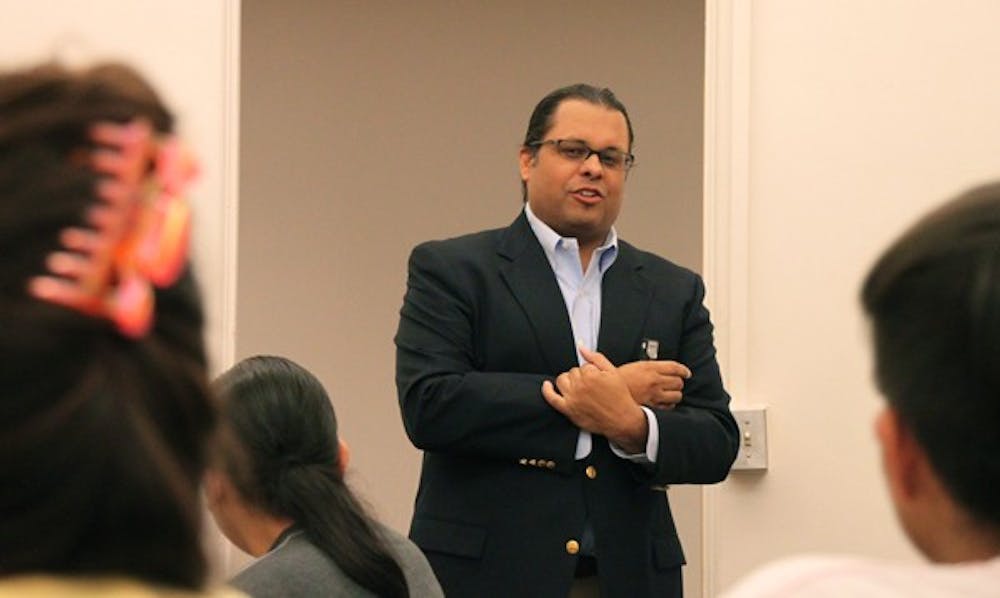We all come from different communities, but we are rooted in lived experiences, said Professor Bryan McKinley Jones Brayboy to a crowd of students in the Canon Leadership Program: Scholar Series at ASU at ASU’s Tempe campus on Monday.
Brayboy is an associate professor of Educational Leadership and Policy Studies in the Mary Lou Fulton College of Education and School of Social Transformation at ASU. He is also an enrolled member of the Lumbee Nation, an American Indian tribe from North Carolina.
Brayboy spoke about his research on indigenous knowledge systems in American Indian education. American Indian indigenous knowledge systems incorporate various tribes’ culture, skills, beliefs and knowledge developed over time.
He described it as a way of knowing, being, teaching, learning and valuing.
“At the center of indigenous knowledge systems is the centrality of communities,” Brayboy said.
He said indigenous knowledge systems aren’t the opposite of Western, textbook-based education, but the systems do have differences in the way people learn, share and gather information.
Indigenous people root their education in life experiences and the real world, and systematically pass on that discovered knowledge to future generations, he said. The evolving knowledge is essential to survival. Some knowledge is open to everyone, while some is sacred and learned after special training.
Brayboy quoted philosophy professor Brian Yazzie Burkhart’s retelling of the famous Descartes saying, “I think therefore I am” to “We are therefore I am.”
Having a sense of humility and understanding between human beings’ relationships to other human beings, places and inanimate objects is another part of indigenous knowledge Brayboy said.
“Native people have always been scientists,” he said, explaining how American Indians have observed patterns and changes in the world in agriculture, weather and the environment before modern science took notice.
Brayboy said indigenous knowledge systems can help ground students in their cultural values and wisdom, and provide them with a relationship to the world, but sometimes they have to adapt to a new environment, such as a university.
This adaptation to a new learning system can create tension. Brayboy talked about the challenges American Indians students face in institutional higher education, and said those present at his lecture were representing others who were unable to make it that far.
He said some of the obstacles include lack of finances, lack of role models and cultural incongruities. He added it was important for American Indian students to serve themselves and others through education.
The Canon Leadership Program: Scholar Series at ASU is a project designed by four ASU students: Robert Howard, Apphia Shirley, Julanda Frank and Rosalind Tayah. The students plan and develop programs and American Indian faculty speaking events.
Howard, an accounting and American Indian studies senior, said he thought it was important for diverse speakers like Brayboy to share their experiences with the ASU community.
“It’s applicable to our struggle,” Howard said about how indigenous knowledge is used by students in higher education. “[Indigenous knowledge] may not be accentuated by a Ph.D, but it’s accentuated with experience.”
Laura Gonzalez-Macias, the program manager of the American Indian Student Support Services and facilitator of the speaker series, said creating role models was another significant part of inviting scholars like Brayboy to speak.
She said the center’s role is to be a “bridge between ASU and the tribal communities.”
“We want to help them find a place here and feel the Sun Devil way,” Gonzalez-Macias said.
Exercise wellness and health promotion senior Chantal Nez said she went to Brayboy’s lecture to apply the principles of indigenous knowledge to her own career path.
“I want to get into diabetes and obesity prevention on the reservation,” Nez said. “I want go back to my community ... this gives me utilities and pointers.”
Brayboy said he hopes there will be more awareness of indigenous knowledge in the future and more credit given to the genealogy of ideas.
Reach the reporter at naberra@asu.edu





